1Heart Way Karate
About
As a female, pursuing 4th degree level instructor, teaching martial arts (karate) is an individual journey with my students and their families. I believe in allowing natural development of the techniques and learning at the rate of the student.
How quickly one learns determines the testing schedule which is not group-oriented. I accept students ages 5 to adults and am family-friendly.
My goal is to raise personal safety awareness, teach skills and techniques that build flexibility, speed, strength, endurance, coordination, and balance; all of which enrich and empower all endeavors in life.
Karate has been a passion of mine for over the 20 years I have practiced. I love nothing more than to watch a student work and grow through the techniques of traditional karate creating building blocks for self-defense through muscle memory, confidence, self-control, while developing the ability to protect self and others.
We are a competition school and do periodically compete as safe and well-organized tournaments come up.
Points of interest: I am a champion in Kata and creative forms.
I have worked with and understand special needs students. (Physical, behavioral, and emotional multiple personalities)
Specialties
Student's age
Disciplines interested in
Experience level
Goals
Class type
Number of students
Photos and videos
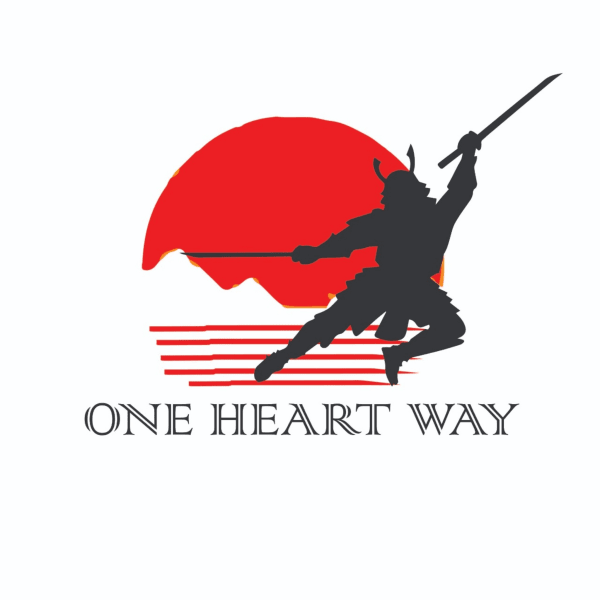
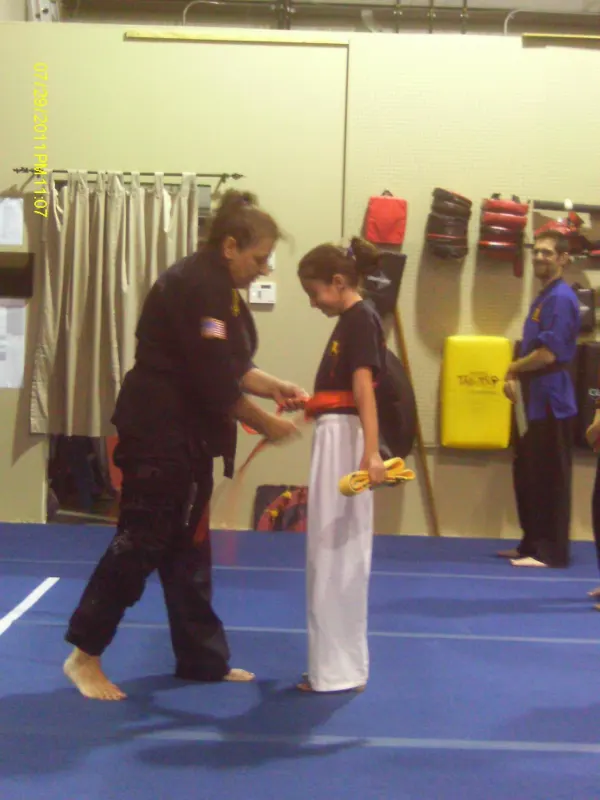
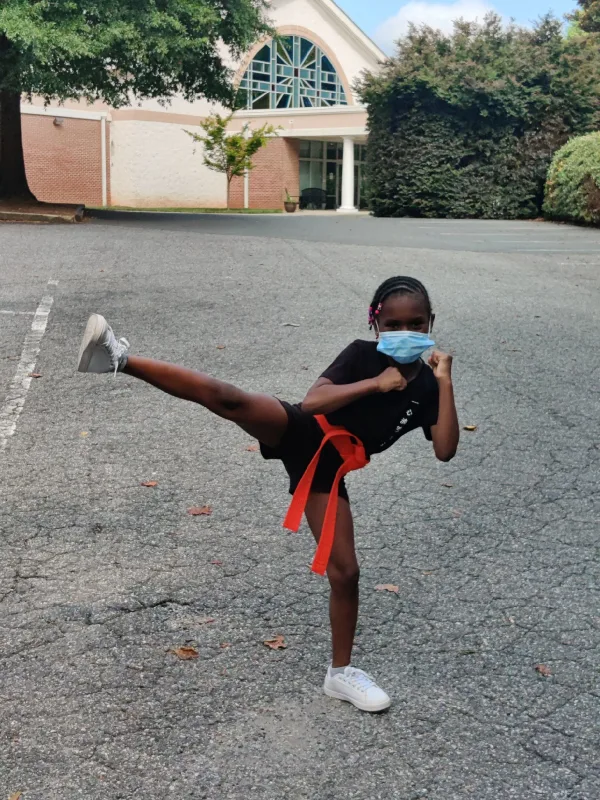
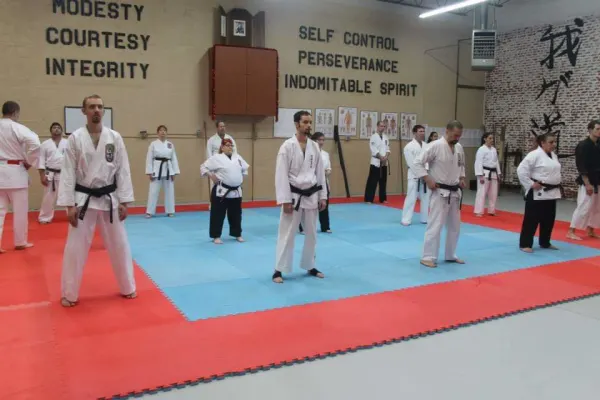
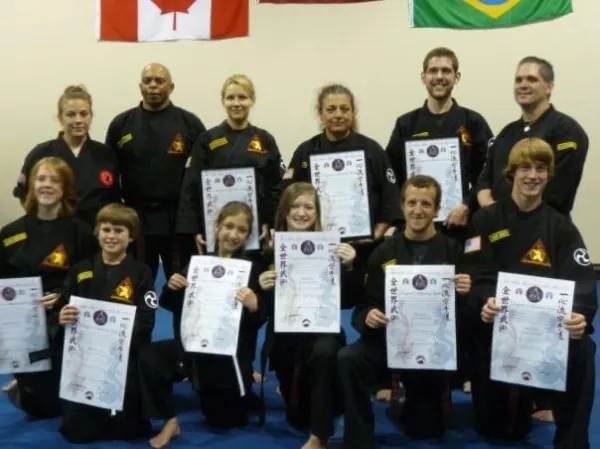

Reviews
Bridget S.
Frequently asked questions
What is your typical process for working with a new student?
The age is relevant for this question due to the learning ability and style of each student.
The first lesson begins with "show me" so I can examine the natural tendencies of how the student operates the body. Such skills as the fist, punch, kick, they exhibit will give me a starting point. Asking parents of students up to 16 describes why the lessons are requested and to determine what they expect from the lessons and if they have any expectations that need to be addressed. Meeting with them and the student ensures I cover the parents' concerns for youth students.
Students 4 to 6 will experience their first lessons with "play and work" scenarios to see how they respond to direction and their natural behavior. While "playing" they will practice elementary skills they will want to show their parents. The parents or guardians are generally able to observe to see how the student is responding to me and is engaged. Both parent 'and student' leave with basic expectations of the "work-play" dynamic which can be adapted to home teaching the youngest student that home and class require good behavior and self-control so they do not hurt themselves or any classmates or siblings. The student only knows they want to have fun learning but also mimics home lessons regarding learning about boundaries. Stranger danger is only about getting away from danger, what to do, and where to go.
Adults of course have their own reasons. Wanting to take karate lessons will take place learning a wide variety of skills, practice, and scenarios leading to rank appropriate techniques for escape, engagement, or safety of others.
Karate is very dynamic in what one learns but also in how it is taught to achieve understanding, retention, goals, and results.
What education and/or training do you have that relates to your work?
My training began with putting my girls into karate lessons and watching them achieve and learn something useful while building them physically, and mentally leading to a feeling of self value. I began as a parent assistant and was given basic lessons that immediately gave me an inner confidence and personal satisfaction I did not know before. I encourage these opportunities for parents and older siblings 18 and above.
Black belt is not an expectation as much as it is a personal journey that is earned and desired not just given; therefore some take longer than others.
It is the responsibility of the individual student sees where it fits into their lives. In the case of minors, many parents require their child to complete to Black belt prior to the end of High School. Then they have several options to take advantage of continuing training and teaching.
Time in Karate has taught me to believe in myself and what I am capable of. It is my passion.
I try to apply lessons learned and beliefs into how to treat, train, and motivate others at work, in the dojo, and in life. What I have learned is I do not have to alter my life activities because of fear and lack of confidence. I know I can help myself and others if I need to.
Do you have a standard pricing system for your lessons? If so, please share the details here.
There is a one time $50 registration fee per student (includes uniform at yellow belt and curriculum plus a coupon for one age-appropriate training stick upon promotion to yellow belt)
Introductory lesson: $10 per student
Regular Classes: $15 per lesson as you go (punch card) or $50 a month (unlimited). (Includes *1+ class a week - *Once we get a few more students, I will be looking into adding a class or two per week)
Classes are self-paced and no student is tested before they feel ready.
Testing fees:
white to yellow - 10$
yellow (2 sticks - age 6and up) to orange (Jo) 35$
Intermediate levels (Green (Tonfa), Blue (Bo)) - 45$
Advanced ( Purple (Sai), Brown (competition Bo) - 55$
Black Belt - 70$
For example, testing from orange to green may include approximately 1.5 hours of test time. This covers all rank material from white to orange, including self-defense/ stranger danger skills, expected responses, history, vocabulary, knowledge of codes and ethics of karate as they relate to martial arts and adapted to real-time life. **(level-appropriate Weapons are included)
*** All testing is age-appropriate and all physiological aspects and learning styles are considered.
How did you get started teaching?
My training began with putting my girls into karate lessons and watching them achieve and learn something useful while building confidence, strength, agility, flexibility, focus, and more. All of my kids lived the lesson that "you can accomplish anything you put your mind to ". One achieved Brown belt while two went all the way to BlackBelt.
The past 20+ years has offered me the opportunity to earn black belt in 6 years. I continued to train and currently work on ranking to 4th degree Isshin Ryu karate / certified instructor.
I have witnessed the promotion of many young men and women to black belt from white belt all of which went on to bright futures. Several moved on to military while a majority graduated college and started life with wonderful careers.
Black belt is not an expectation of life, it is personal journey that is earned and desired where entitlement does not factor in. It becomes a part of your personality and whereas life will interrupt it is an achievable goal with great reward.
Karate has taught me to apply lessons learned o be a better leader, person, mom and more. It has taught me inner reward is stronger than materialistic'values'. What I have learned is given to others through teaching and I would not have it any other way.
What types of students have you worked with?
Ages: 4 to adults
Special conditions include ADD, ADHD, partial loss of sight, deafness, personal trauma, conditions such as autism and multiple personalities, and helping change negative behaviors through patience, and correction using positive personal reinforcement (with psychological and medical guidance as needed, parental or caregivers input, recommendations, and guidance),
Describe a recent event you are fond of.
Any event in Martial Arts is watching a student who experienced a lack of confidence achieve the belief he could do something he never thought he could do. Building rank In a martial art is a sense of personal power you cannot lose and inspires confidence to persist and achieve. This is not specific to only karate and transcends life experiences.
I had a student who lacked confidence and was very shy. We attended a tournament and as it turned out he was the only one to come and almost did not participate.
I told him two things: 1) smaller competitors can be deceiving since they are smaller they are constantly sparring taller students. Therefore, they are trained to fight to their strengths). Since he is tall, their strategy would be different from his and the first time one caught a punch - he learned to respect other people's strengths and that we were all-powerful in our own ways. It's a matter of how we use it. A lesson in strategy - a lifelong skill.
The other thing was his parent paid entry which was for two events. He had practiced a great deal to do his kata so I said he needed to do the kata with sparring in mind.
Use the opponent in his mind to guide each movement of the kata. He agreed and the last thing I said to him as he entered the ring was "do his best not for me or others, but for himself". It was not perfect but he did take 3rd place out of 4. For him an absolute shining moment. He took first in sparring but admitted the young man he fought in the final round was half his size while admitting he was a good fighter so he had to work for the win.
This was a moment in his life he would remember when all his classmates decided they were not ready or felt they would fail and disappoint. They learned from this student that you do not doubt your abilities but you bring what you know to the table and show an attitude that you will figure it out and Achieve honorably learning from your mistakes and adjusting rather than just give up before you can show yourself you are worth the effort. Life is full of chances and opportunities but you have to make the first move.
What advice would you give a student looking to hire a teacher in your area of expertise?
Go the school and talk face to face for the first impression. (Or thes days zoom)
Most schools offer free or low cost first lessons for the prospect to experience the class, students, and the teachers methods.
These formats are good for fact gathering and comparisons. One does not get the whole picture from one dojo and sometimes may not even meet the lead instructor.
Promotions should be based on the students comfort (confidence), age, and maturity level, and yes, patience. Rewards are not to be expected, but come to those willing to do the work, put in the effort, and understand that they are good enough to be successful.
Sometimes the teacher needs to allow that to develop and by understanding the students Learning style, personality, and character is more important than a time saving large group lesson or test. You cannot carbon copy students requiring them to test together just because they started together. Learning in many cases come at a different approach in a variable time allowing for confidence and maturity to provide the base of the training.
What questions should students think through before talking to teachers about their needs?
Does the instructor seem to love the art and enthusiastic about teaching. How do they interact with students of various abilities or behavior?
Does the instructor include the parent or caregiver and allow them to be involved and give input and set their expectations? Does they instructor build trust and assure the student and parent and build a lasting report? Do they explain how motivation is encouraged and how recognition versus discipline is more far more effective until the student has learned to find self satisfaction versus entitlement.